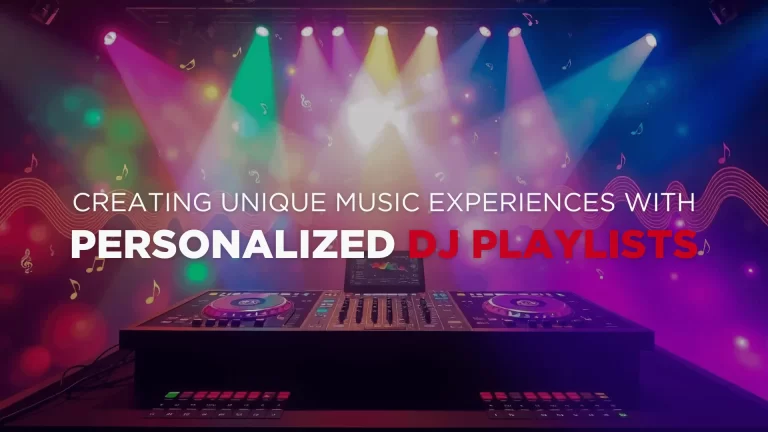AI in Music Technology: Changing the Game for Music production and creation
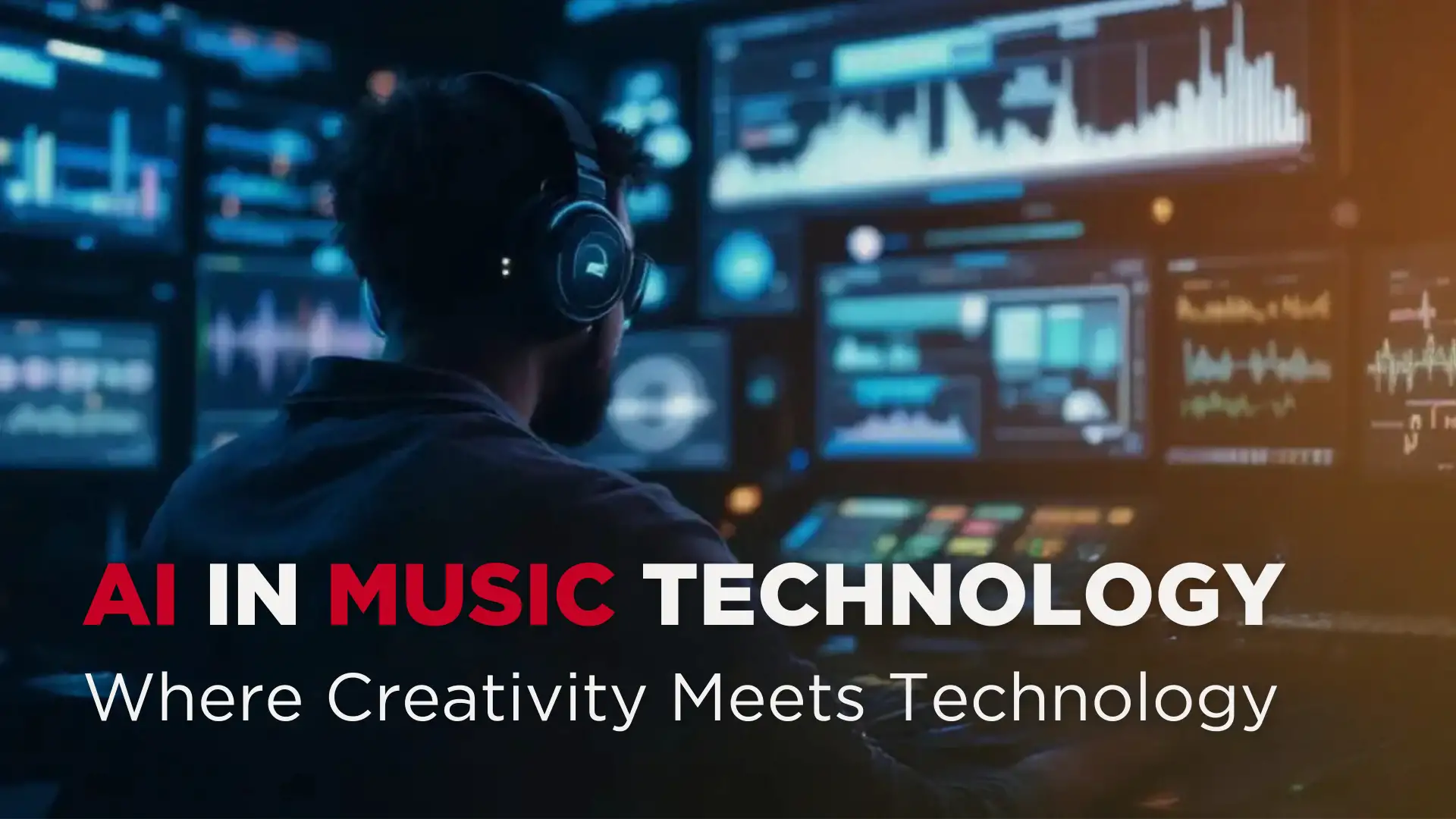
The world of music production and creation is changing quickly, thanks to AI in Music Technology. Tools like Amper Music are leading the way, allowing musicians to use artificial intelligence for groundbreaking compositions.
AI is playing a significant role in changing music technology:
- Faster Creation: Musicians can easily come up with melodies and improve song structures.
- Better Personalization: AI customizes listening experiences, creating playlists that match individual preferences.
- New Tools: AI opens up creative opportunities, such as creating virtual instruments or producing tracks with famous artists.
As the music industry embraces these technological advancements, it faces both opportunities and challenges. AI enhances productivity and creativity; however, it raises ethical questions regarding copyright and ownership of AI-generated content.
This change represents a significant shift, where human creativity combines with machine efficiency. The collaboration between artists and AI tools leads to a new era in music production. With AI’s capabilities at their disposal, musicians are ready to discover new possibilities in sound and composition.
Scott Evans DJ is supported by its readers. If you purchase through any link on the site, we may earn a commission. Learn more
The Rise of AI in Music Production
Artificial intelligence (AI) is changing the music production industry, transforming how artists create and produce music. With the help of machine learning algorithms and data analysis, AI can now compose, arrange, and improve music more efficiently than ever before.
Understanding AI in Music Production
At its core, AI in music production involves using intelligent systems to assist musicians and producers in various stages of the creative process. This includes:
- Composition: Generating melodies and harmonies
- Arrangement: Structuring song elements like verses and choruses
- Mixing: Optimizing sound levels and effects for a polished final product
These capabilities enable both novice and experienced musicians to explore new creative avenues without needing extensive technical expertise.
Key Advancements in AI Technology for Music
Recent advancements have significantly expanded the capabilities of AI within the music industry:
- Deep Learning: Enhanced understanding of musical patterns, enabling more sophisticated composition techniques.
- Natural Language Processing (NLP): Allows AI systems to interpret lyrics and generate vocal melodies that align with specific themes or emotions.
- Real-Time Collaboration: Facilitates live interaction between musicians and AI, enabling spontaneous creation sessions.
These developments contribute to a more dynamic creative landscape where technology complements human artistry rather than replacing it.
Popular AI Tools for Music Production
Several tools have emerged as frontrunners in the realm of AI-powered music production. Below are some noteworthy examples:
- Amper Music: An AI composer that allows users to create custom tracks by selecting mood, style, and instrumentation. It caters to content creators seeking royalty-free music tailored to their projects.
- AIVA (Artificial Intelligence Virtual Artist): Primarily focused on composing classical music, AIVA uses deep learning algorithms trained on historical compositions to generate original pieces that resonate with traditional styles.
- Soundraw: This tool offers users the ability to generate unique soundtracks based on user-defined parameters such as tempo and genre. Its intuitive interface enables quick adjustments to create the desired sound.
- Jukedeck: Specializing in creating background music for videos, Jukedeck allows users to input specific needs and receive customized compositions that enhance audiovisual content.
The functionalities of these tools showcase how artificial intelligence is actively participating in music technology. They empower artists by simplifying complex processes while still encouraging creativity. As these technologies continue evolving, they hold immense potential for reshaping the landscape of music production, bridging gaps between innovation and artistry.
How AI Enhances Creativity in Music Production
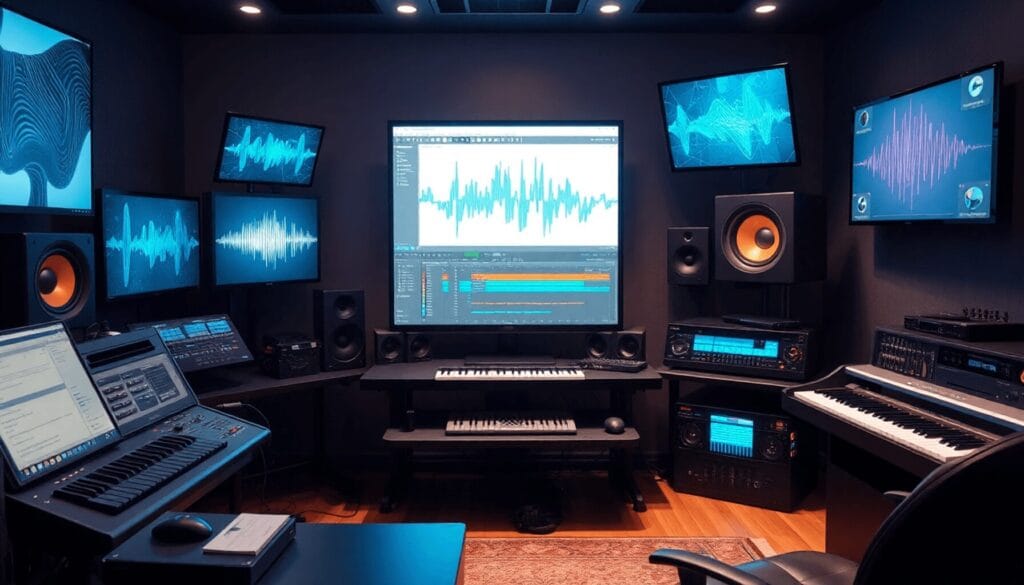
The combination of AI and creativity is changing the way music is made, giving musicians the opportunity to explore new possibilities in digital composition. Artists are using AI tools to improve their creative processes, coming up with original ideas and compositions that may not have been possible otherwise.
Ways AI Assists Musicians
1. Idea Generation
AI algorithms can analyze large amounts of musical data, find patterns, and suggest melodies or chord progressions. For example, platforms like Amper Music allow users to input themes and moods, producing customized compositions in seconds.
2. Composition Refinement
Tools powered by AI can improve song structures, helping artists arrange their tracks more effectively. By studying successful songs within specific genres, these systems provide insights into optimal arrangements, transitions, and dynamics.
3. Virtual Instruments
AI-driven virtual instruments offer musicians new sounds to explore. These instruments can create sounds based on user inputs or even learn from the artist’s style over time, resulting in a truly personalized experience.
Collaborative Projects Between Humans and AI
Collaboration between human musicians and AI has resulted in innovative projects that push creative limits. This partnership allows artists to combine their emotional depth with the computational power of machines.
Examples of Collaborative Projects
- Taryn Southern’s “I AM AI”: This album features tracks co-created with an AI program called AIVA (Artificial Intelligence Virtual Artist). Southern used AIVA’s compositions as foundational elements, adding her vocals and personal touches on top of the generated music. The project exemplifies a harmonious partnership where human artistry meets machine efficiency.
- “Hello World” by YACHT: The electronic band YACHT used an AI system to create the entire album. They provided the machine with lyrics and musical themes that reflected their style, allowing it to produce tracks that were then refined by the band members. This project demonstrates how collaboration with AI can lead to surprising yet captivating outcomes.
- Endlesss App: This platform focuses on collaborative jamming with AI as a facilitator. Musicians can join sessions in real time, creating loops and samples together while the app suggests improvements based on collective styles. It’s a live representation of how technology promotes creativity through collaboration.
The rise of AI in Music Technology marks a significant change in how artists approach creation. By embracing these tools, musicians not only enhance their creativity but also redefine what it means to collaborate in the digital age. AI in Music Technology is revolutionizing the creative process, offering new possibilities for composition, production, and performance. As artists continue to explore and integrate these advanced tools, the landscape of music creation is evolving, showcasing the transformative potential of AI in Music Technology.
Impact of AI on Different Music Genres
AI is reshaping the landscape of music across various genres, driving innovation, and altering traditional production methods. Its influence extends from stock music to classical music as artists and producers increasingly integrate AI technologies into their creative processes.
Exploration of Genre-Specific Applications
Each genre experiences unique transformations due to AI’s capabilities. Here’s how some specific genres are influenced:
1. Electronic/Dance Music
AI tools like Amper Music enable DJs and producers to generate beats rapidly, allowing for experimentation with different sounds and structures. Algorithms can analyze crowd preferences during live performances to adjust setlists in real-time.
2. Pop Music
AI assists in creating catchy hooks and melodies that resonate with listeners, drawing from vast data sets of successful tracks. Notable collaborations have emerged, where pop artists use AI-generated elements in their songs, enhancing mainstream appeal.
3. Classical Music
AI technologies help composers generate compositions that mimic various styles or even blend classical and modern elements. Tools like AIVA (Artificial Intelligence Virtual Artist) are capable of producing symphonies, pushing the boundaries of traditional composition.
Case Studies: Genre-Specific Applications of AI in Music Production
Examining specific cases reveals how diverse genres harness the power of AI.
1. Stock Music
Platforms such as Jukedeck utilize AI to create royalty-free stock music tailored to specific moods or themes. These tools democratize music creation, enabling content creators to access high-quality soundtracks without extensive resources.
2. Classical vs. Pop
AIVA has produced classical compositions that have been performed by orchestras, demonstrating its ability to replicate the nuances of human composers. In contrast, pop artists like Taryn Southern have collaborated with AI programs to produce entire albums, showcasing a seamless blend of human creativity and machine learning.
The impact of AI in Music Technology isn’t limited to creating new sounds; it also informs music trends. By analyzing listening patterns through streaming platforms, AI helps predict which sounds will become popular next. This predictive capability allows artists across genres to tailor their work according to emerging trends while maintaining their authentic style. AI in Music Technology is thus not only shaping the creation of music but also influencing its reception and popularity, demonstrating the far-reaching effects of this innovative technology in the industry.
The future promises even more integration between genres and technology. As artists explore these innovations, they redefine musical expression through collaborative efforts with machines. The journey continues as we witness how these genre-specific applications evolve within the broader narrative of AI in music technology: changing the game for production and creation.
The Role of AI in Live Performances and Artist Discovery
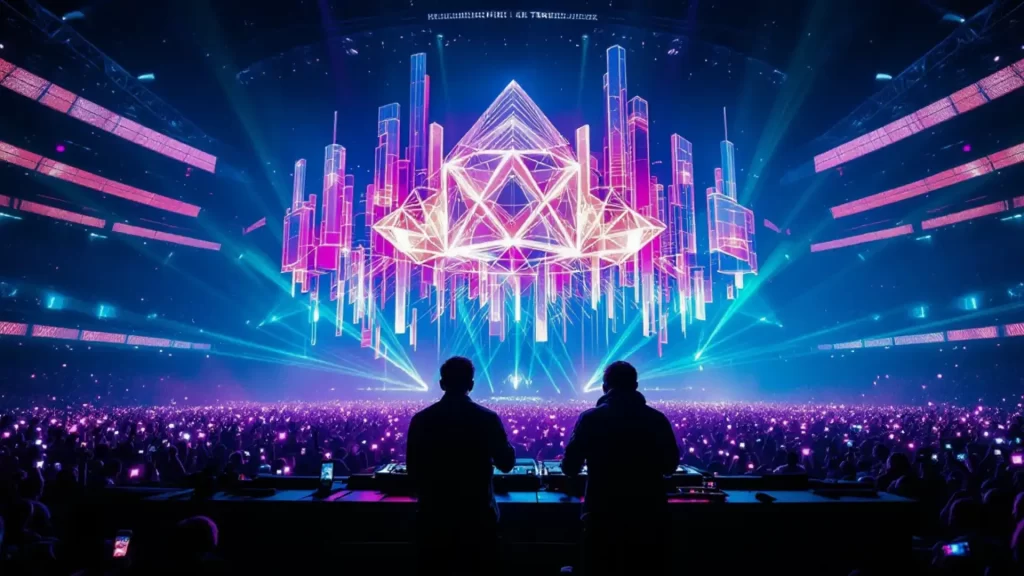
AI is changing the game for live performances, making them more interactive and engaging for the audience. With the help of smart cameras and other technologies, performers can now seamlessly interact with visual elements during their shows. These advanced systems have the ability to analyze how the audience is reacting and make real-time adjustments to things like lighting, visuals, and even sound effects. This means that every performance can be unique and tailored to the specific crowd, creating an unforgettable experience for fans.
How AI Enhances Live Performances
- Real-time Interaction: Performers can now use AI-powered technologies to directly engage with visual elements on stage, creating a dynamic and immersive experience.
- Audience Analysis: Smart systems can analyze audience reactions in real-time, allowing for instant adjustments to lighting, visuals, and soundscapes based on their responses.
- Focus on Performance: With AI taking care of technical aspects such as lighting and visuals, artists can fully concentrate on delivering an exceptional performance without any distractions.
In addition to enhancing live shows, AI in Music Technology also plays a crucial role in helping new artists get discovered. Streaming platforms are using algorithms powered by artificial intelligence to create personalized playlists for listeners. By analyzing data about individual preferences and trends, these platforms are able to recommend songs from independent artists who may not have mainstream visibility yet. This application of AI in Music Technology is revolutionizing the way emerging artists can reach potential fans, democratizing the music discovery process.
How AI Helps Independent Artists Get Discovered
- Data-driven Recommendations: Streaming services utilize AI algorithms to understand listener behavior and preferences, enabling them to suggest music from lesser-known artists who align with those tastes.
- Breaking Barriers: Traditional methods of promoting music often favor established artists or genres. However, through AI-powered recommendations, independent musicians have a chance to reach new audiences who may not have discovered them otherwise.
- Connecting with Likely Fans: By leveraging data insights provided by streaming platforms’ algorithms, independent artists can identify potential listeners who are more likely to enjoy their music and tailor their marketing efforts accordingly.
The combination of AI technology in live performances and artist discovery has the potential to reshape the music industry landscape. It not only enhances entertainment experiences but also empowers independent musicians by giving them access to wider audiences that were previously difficult to reach.
This evolving dynamic between artificial intelligence and the world of music showcases how AI in Music Technology is transforming both live shows’ spectacle aspect as well as opportunities for emerging talents within a competitive market. The overall impact of AI in media and entertainment is profound, with AI in Music Technology paving the way for a future where technology and creativity coexist harmoniously.
Future Trends in Music Technology: Collaboration Between Humans and Machines
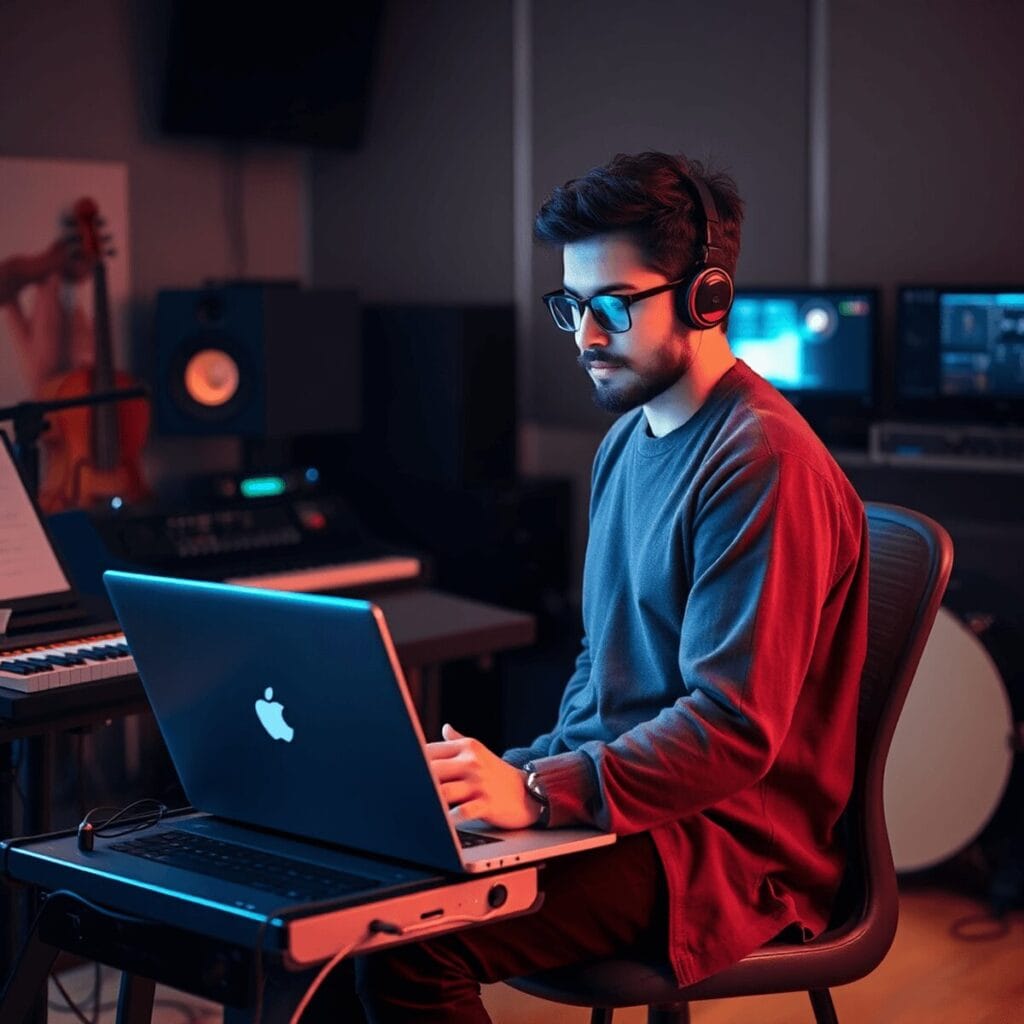
Predictions for the future of AI in music point towards a deeper integration of technology in production. The following trends are anticipated:
1. Enhanced Collaboration
Human engineers will increasingly work alongside AI systems, combining the emotional depth of human creativity with the efficiency of machine-generated outputs. This partnership can lead to unique sonic landscapes that may revolutionize music.
2. Benchmark Results
As AI continues to evolve, its ability to analyze and adapt based on benchmark results will improve. Expect AI tools to learn from successful tracks across genres, offering insights and suggestions that reflect current trends while pushing creative boundaries.
3. Personalized Experiences
Advanced algorithms will enable AI to tailor musical experiences for individual listeners, generating customized playlists or even unique tracks based on user preferences.
The relationship between musicians and AI in Music Technology is shifting from skepticism to collaboration. Artists are beginning to embrace AI not as a threat but as a tool that can enhance their creative processes. This evolving dynamic holds great potential for innovative music production, creating opportunities for artists to explore new sounds and styles while maintaining their distinctive voices. AI in Music Technology is opening up new horizons for musicians, allowing them to push the boundaries of their creativity and expand their artistic capabilities.
Conclusion: Embracing Change with Amper Music as a Tool for the Future
The music industry is about to undergo a major transformation thanks to the power of AI in music and innovative tools like Amper Music. As artists and producers discover AI music generators and tools like Amper Music, they realize how the integration of artificial intelligence (AI) can make their creative processes smoother and improve their work.
- AI’s influence on music goes beyond just production; it redefines our relationship with sound.
- Musicians can use this technology to find new ways of being creative, breaking through barriers that were once thought impossible.
For anyone wanting to succeed in this changing environment, it’s essential to understand these developments. With AI in Music Technology: Changing the Game, musicians have the power to accept change, blending human instinct with machine speed for extraordinary musical experiences.
FAQs about AI in Music Technology

DJ Scott Evans
Hey there! I’m Scott Evans, DJ and music tech enthusiast who’s gone all-in on AI music tools. After years behind the decks and geeking out over gear, I discovered how AI can unlock incredible creative possibilities for musicians like us. On this site, I break down complex AI music tech into easy-to-follow tutorials and honest reviews. Think of me as your friendly guide through the AI music revolution – no technical jargon, just practical tips to elevate your sound. Let’s explore what these digital tools can do for your creativity!

